INFINITE POSSIBILITIES:
 PUBLISHED BY THE USC MANN SCHOOL OF PHARMACY AND PHARMACEUTICAL SCIENCES
FALL 2023
PUBLISHED BY THE USC MANN SCHOOL OF PHARMACY AND PHARMACEUTICAL SCIENCES
FALL 2023
ALUMNI SHARE CAREER JOURNEYS
EDITOR IN CHIEF
Michele Keller
MANAGING EDITOR
Susan L. Wampler
CONTRIBUTING WRITERS
Lauren Amico
Dora Dalton
Stephanie Hedt
Christian Hetrick
Stan Wedeking
David Zong
DESIGN
Warren Group | Studio Deluxe
PHOTOGRAPHY
Jeremy Bishop on Unsplash
Ed Carreon
Isaac Mora
Reynaldo Obrero
David Zong
COVER ILLUSTRATION

Sol Cotti
© 2023 BY THE UNIVERSITY OF SOUTHERN CALIFORNIA
MANN SCHOOL
Letters to the editor, questions, comments, address changes, requests to be added/ removed from the mailing list and all other inquiries should be addressed to:
Michele Keller
Chief Communications Officer
USC Mann School of Pharmacy and Pharmaceutical Sciences
1985 Zonal Avenue – PSC 700 Los Angeles CA 90089-9121
kellermi@usc.edu 323-442-3497
MANN.USC.EDU
DEAN
Vassilios Papadopoulos, DPharm, PhD, DSc (hon)
BOARD OF COUNCILORS
David Neu, Chair
Edward Abrahamian
Anil “Neil” Badlani
Melvin F. Baron
Gale Bensussen
Danielle C. Colayco
Daniel Gil
Debrina Johnson
Dong Koo (D. K.) Kim
Dianne Kwock
Ann Young Lee
Vinson Lee
Sohail Masood
David Meek
Kimberly Moore
Shushma Patel
Chao Peng
William Pih
Robert Popovian
Denis Portaro
Raymond Risman
Jacque J. Sokolov
Khanh-Long (Ken) Thai
Kelly Wilder
William A. Heeres, Chair Emeritus
One of the top pharmacy schools nationwide and the highest-ranked private school, the USC Mann School continues its century-long reputation for innovative programming, practice and collaboration.
Founded in 1905 as the USC College of Pharmacy, the school was known as the USC School of Pharmacy from the mid-20th century until 2022, when it received a $50 million endowment and was renamed on behalf of inventor and entrepreneur Alfred E. Mann.
The school created the nation’s first Doctor of Pharmacy program, the first clinical pharmacy program, the first clinical clerkships, the first doctorates in pharmaceutical economics and regulatory science,
and the first PharmD/MBA dual-degree program, among other innovations in education, research and practice. The USC Mann School is the only private pharmacy school on a major health sciences campus, which facilitates partnerships with other health professionals as well as new breakthroughs in care. Uniquely, it owns and operates four pharmacies, with a fifth coming in early 2024.
The school is home to the D. K. Kim International Center for Regulatory Science at USC, the Titus Center for Medication Safety and Population Health, and the Center for Quantitative Drug and Disease Modeling, and is a partner in the USC Leonard D. Schaeffer Center for Health Policy &
Economics, the USC Institute for Addiction Science, the USC Ginsburg Institute for Biomedical Therapeutics, the Southern California Clinical and Translational Science Institute, the USC Center for Neuronal Longevity, and the USC Center for Drug Discovery, Delivery and Development. The Mann School pioneered a national model of clinical pharmacy care through work in safety-net clinics throughout Southern California and is a leader in comprehensive medication management. Results magazine, published semi-annually, highlights some of the school’s latest advances and achievements, as well as the faculty, students, alumni and donors who make this work possible.
ABOUT THE USC MANN SCHOOL OF PHARMACY AND PHARMACEUTICAL SCIENCES
Fields of Dreams
This issue lives up to our publication’s name by illustrating the results that education at the Mann School continues to have on the lives and careers of our alumni. Our cover story puts the spotlight on our graduates—who span generations, degree programs and career focus. While we can only highlight a small number of individuals in these pages, their stories reflect the tremendous impact of our alumni as a whole on pharmacy, pharmaceutical sciences, clinical care, regulatory science and health policy, as well as on the training of future leaders for the field. They are finding—and often forging—new paths of opportunity within and beyond the vast fields that comprise pharmacy and pharmaceutical sciences.
As we celebrate the success and impact being made by our graduates around the world, it is fitting that we also unveil our 2024 Alumni Awards recipients, who will be honored at our annual gala on February 25, 2024. We hope you can join us for this year’s event.
Of course, the Mann School’s strength in preparing students to accomplish their goals relies on our stalwart faculty. We are excited to announce that Gauri Rao, a leader in quantitative systems pharmacology, has joined us as the new director of our Center for Quantitative Drug and Disease Modeling and an associate professor of clinical pharmacy. Learn more about her remarkable body of research on page 8.
In addition, regulatory expert Lawrence Liberti has been appointed to lead the D. K. Kim International Center for Regulatory Science. In that vital role, he succeeds Frances Richmond, founder of our regulatory science program and Department of Regulatory and Quality Sciences, who has been named professor emerita. We congratulate Dr. Richmond on being awarded that well-earned status.
This issue also features an interview with Darius Lakdawalla, the Quintiles Chair in Pharmaceutical Development and Regulatory Innovation and director of research at the USC Schaeffer Center for Health Policy & Economics, a partnership of the Mann School and the USC Price School of Public Policy. Here, he discusses his commitment to expanding patient access to medical innovation and the new model he has developed for valuing health.
Research is another key part of our mission—and another area in which our alumni and faculty excel. We are excited to report on major federal grants awarded to Zhipeng Lu and Tiger Zhang. In addition, a major breakthrough by alumna and postdoctoral scholar Yiqi Christina Lin is featured on page 5. It is my privilege to mentor and collaborate with her on this pathfinding research into neurosteroid production.
Thank you for your continued support as we help our students, faculty and alumni succeed in the fields of their dreams.
Vassilios Papadopoulos, DPharm, PhD, DSc (hon) Dean, USC Mann School
 John Stauffer Decanal Chair in Pharmaceutical Sciences
John Stauffer Decanal Chair in Pharmaceutical Sciences

Insulin is produced in the beta cells of the pancreas. It binds to specific receptors on cells to help our bodies use or store glucose from food, thereby regulating blood-sugar levels. Insulin produced synthetically is used to treat type 1 diabetes. USC Schaeffer Center researchers continue to address the need for improved patient access to insulin (see page 9).

1 RESULTS FALL 2023
Broad Spectrum
4 / ZHANG GARNERS $2.5M NIH GRANT
5 / UNLOCKING THE POTENTIAL OF NEUROSTEROIDS
6 / DARIUS LAKDAWALLA: A NEW MODEL FOR VALUING HEALTHCARE
8 / GAURI RAO JOINS USC MANN FACULTY
9 / INFLATION REDUCTION ACT’S CAP ON INSULIN COSTS
10 / NEW BEGINNING FOR FUTURE PHARMDS
11 / LIBERTI NEW DIRECTOR OF D. K. KIM INTERNATIONAL CENTER
Cover Story
12 / LIMITLESS POSSIBILITIES: ALUMNI CAREER PATHS
Giving
20 / A LIFE WITHOUT LIMITS: MEL BARON’S MEMOIR
21 / USC MANN WELCOMES FOUR NEW BOARD MEMBERS
Alumni
22 / PRESCRIPTION FOR LOVE
23 / 2024 ALUMNI AWARDS
24 / CLASS NOTES
Faculty
26 / LU AWARDED $2.2M NIH GRANT
26 / MANGUL AWARDED NSF GRANT
27 / NEW FACES
27 / CAMARERO RECEIVES MELANOMA RESEARCH GRANT

27 / CONGRESSIONAL HEARING ON BIOMEDICAL INNOVATION AND ACCESS
Students
28 / COMMENCEMENT 2023
30 / NEW USC MANN UNDERGRAD COURSE
30 / UNDERSTANDING MECHANISMS OF BRAIN INFLAMMATION
31 / LESSONS IN GLOBAL HEALTHCARE
32 / PHOTO SHOP
IBC / LEAVING A LEGACY
2 USC MANN SCHOOL
Contents
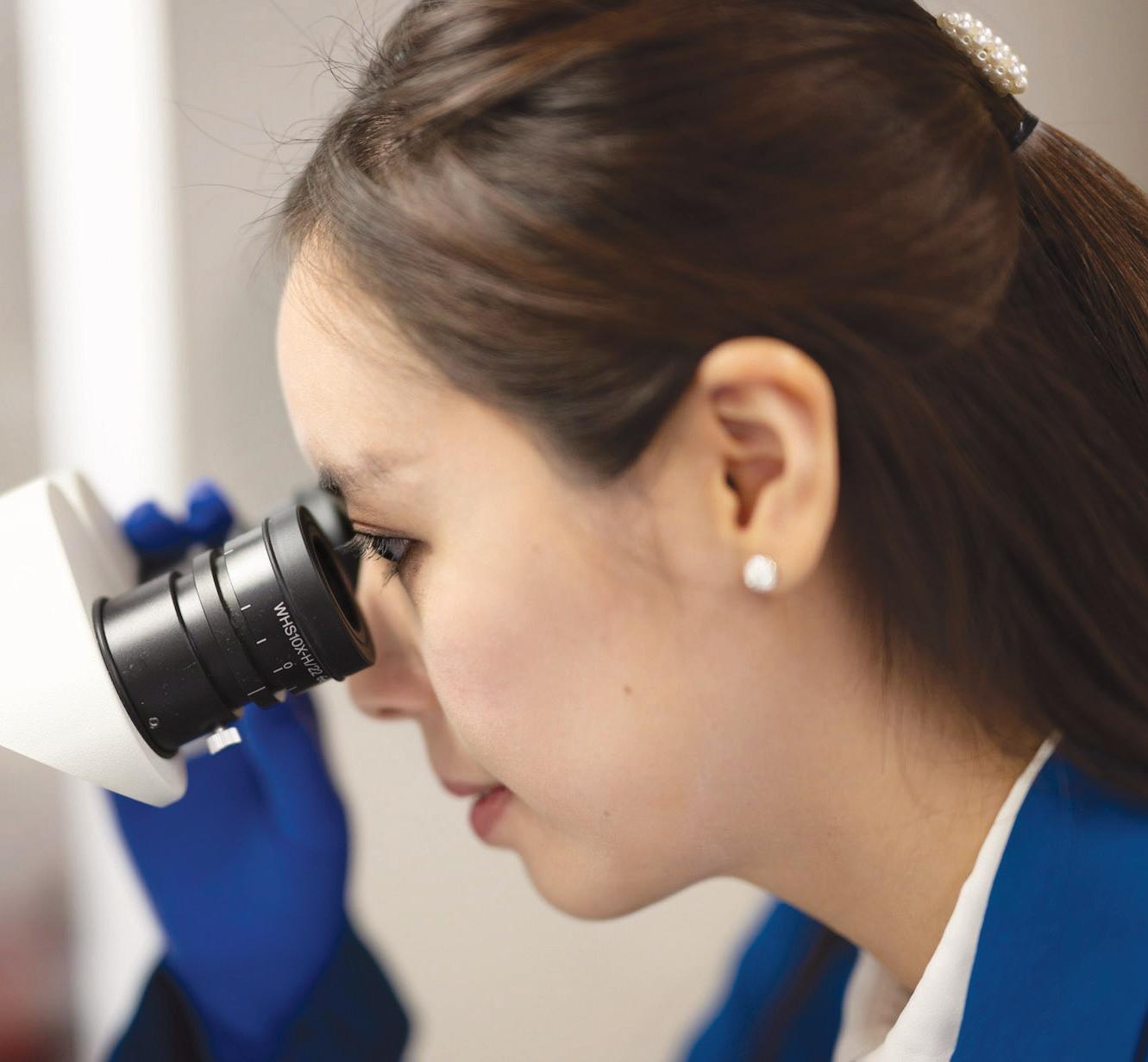
3 RESULTS FALL 2023
Postdoctoral research associate Yiqi Christina Lin, first author on a breakthrough study of neurosteroids (see story, page 5)
Zhang Garners $2.5 Million NIH Grant
Yong (Tiger) Zhang, USC Mann associate professor of pharmacology and pharmaceutical sciences, has been awarded a $2.5 million National Institutes of Health grant for his project “Reprogramming Exosomes for Novel Immunotherapy of Triple Negative Breast Cancer.”
The five-year research initiative aims to develop innovative therapeutic candidates with enhanced effectiveness and safety profiles for treating triple-negative breast cancer. In most patients, this highly aggressive subtype will recur and metastasize within three years of disease development. As patients usually develop resistance to the current standard of chemotherapeutic care, treatment options are limited and long-term outlooks are bleak.
Zhang is leveraging immunotherapy to help brighten the prognoses for triplenegative patients. “We aim to exploit a multidisciplinary approach for engineering human cell-derived nanoparticles that can direct and activate the immune system for selective elimination of tumors,” Zhang says.
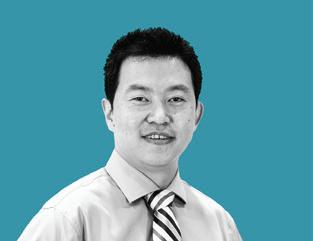

The only type of immunotherapy currently approved for advanced triplenegative breast cancer is pembrolizumab, which must be used in tandem with chemotherapy. Yet a recent clinical trial revealed that this combination therapy only extended lives by about seven months compared to chemotherapy alone.
In contrast, Zhang says his research may “lead to the generation of a new class of immunotherapeutics for cancer” that
are more effective and have fewer side effects than the current method. Triple-negative breast cancer accounts for 10% to 15% of all breast cancers. It tends to be more common in women who are younger than age 40, are Black or have a BRCA1 gene mutation.
4 USC MANN SCHOOL BROAD SPECTRUM
Unlocking the Potential of Neurosteroids
While the brain’s abilities include the capacity to answer innumerable questions, the organ itself still holds countless mysteries.
Dean Vassilios Papadopoulos and postdoctoral research scholar Yiqi Christina Lin have solved one of those riddles by revealing how the brain produces pregnenolone—the “mother hormone” that is the progenitor of all neurosteroids.

Neurosteroids are formed by the brain to modulate nervous system function, and changes in their levels have been implicated in neurological conditions such as Alzheimer’s disease as well as in psychiatric and mood disorders. Therefore, neurosteroids represent a vital new frontier in biomedicine. Yet their therapeutic possibilities have barely been tapped. For example, the first approval for a neurosteroid drug did not come until 2019, when the Food and Drug Administration authorized brexanolone for postpartum depression.
“It wasn’t until the late 1980s that we learned the brain can make its own steroids,” Papadopoulos notes. “But questions remained about how this occurs because nobody had spotted the first enzyme responsible for manufacturing those steroids. We could find it in mice but not in the human brain.”
The breakthrough arose from Papadopoulos and Lin’s realization that, although cholesterol remains the “father” of steroids, the “mother” neurosteroid pregnenolone is made by a different enzyme in the brain than in other organs. Under Papadopoulos’ direction, Lin used multiple approaches to find evidence that the enzyme metabolizing cholesterol to give birth to steroids in organs such as the gonads and adrenals hadn’t been found in the human brain because it wasn’t there.
“I spent my whole thesis proving that,” says Lin, who earned her PhD as a scientist in the Papadopoulos laboratory before continuing there as a postdoc. But then, having shown that a different enzyme must be responsible, the researchers had to determine which one that was.
Building on their previous investigations and Papadopoulos’ decades of work in steroid exploration, the scientists screened hundreds of enzymes. With the use of bioinformatics, they narrowed down their search to a handful, on which they performed drug inhibition and knockdown experiments. They ultimately identified the enzyme CYP1B1 as being involved in pregnenolone synthesis in the nervous system.
These findings, published in the Journal of Biological Chemistry in August 2023, are important since pregnenolone, as well as the neurosteroid dehydroepiandrosterone (DHEA), have been found to be elevated in Alzheimer’s patients. On the other hand, the levels of pregnenolone sulfate—a product of pregnenolone—and other neurosteroids are generally lower in patients with major depression, bipolar disorder and other mood-related conditions.
Understanding the mechanisms that drive pregnenolone production opens potential avenues to devising more effective treatments for neurological diseases and mood disorders.
The next direction to take, Lin says, “is to look at the enzyme kinetics” of CYP1B1 to form pregenolone. “Because nobody has ever studied this, we want to see the rate at which this enzyme can make these steroids.”
“It will take time,” Papadopoulos adds. “But discovering this physiological process is the link to the understanding needed to develop new treatments.”
The paper’s other authors are USC Mann PhD candidates Garett Cheung and Zeyu Zhang. The work was supported by funds from the USC Mann School.
5 RESULTS FALL 2023
PhD student Garett Cheung, Dean Vassilios Papadopoulos and Yiqi Christina Lin at work in the lab

6 USC MANN SCHOOL BROAD SPECTRUM
GRACE Note
Darius Lakdawalla is the Quintiles Chair in Pharmaceutical Development and Regulatory Innovation at USC Mann and director of research for the USC Schaeffer Center for Health Policy & Economics—a partnership between the Mann School and the USC Price School of Public Policy that ranks fifth in the world in the field. A prolific scholar who is among the top 2% mostcited researchers, he recently co-wrote Valuing Health, published by Oxford University Press, which details his Generalized and Risk-Adjusted Cost-Effectiveness (GRACE) payment model. Lakdawalla developed GRACE with co-author Charles Phelps as a patient-centered way to value healthcare treatments. Here, he discusses what drives his research.
How would you describe the problems you’re working to solve?
For years, a big research interest of mine has been defining what’s wrong with the traditional economic theory of valuing health. The current model of cost effectiveness doesn’t accurately measure the value of treatments. It considers them less valuable for people with a lower quality of life when the opposite should be true. So the prices paid by insurance companies, governments and others for treating cancer, Alzheimer’s and other severe conditions are too low. To me, the issue is how do you reorient the healthcare system around the needs of patients?
How does GRACE address that?
We apply the economic concept of diminishing returns to account for the fact that it’s more valuable to treat severe illnesses than milder conditions. For example, somebody living in a 200-square-foot apartment derives more value from an added 500 square feet than someone in a massive mansion does. The same is true for health. Evidence suggests that people in very sick states—like needing a new liver—place more value on even modest improvements than do healthier people who, say, can’t run as many miles as they used to.
Are you optimistic that GRACE will be adopted widely?

The timing is propitious, since the Inflation Reduction Act says that the federal government can’t use traditional cost effectiveness to determine fair prices. So there’s a vacuum, and GRACE meets the criteria of the Inflation Reduction Act because it doesn’t discriminate against the disabled, aged or terminally ill.
What makes the center’s collaboration between the Mann and Price schools so notable?
The Schaeffer Center being a marriage of pharmacy and public policy schools is significant as the pharmaceutical industry has been the site of some of the most contested domestic policy battles in recent U.S. history. We’ve been at the center of that. Policymakers on both sides of the aisle pay a lot of attention to our findings and, over the past decade, our research has been cited in economic reports by presidents of both parties. That’s because we’re driven by science and not politics or ideology. We believe that policy can be improved based on science— and that should be of interest to everybody, regardless of party affiliation.
7 RESULTS FALL 2023
Gauri Rao Joins Faculty
An expert on quantitative systems pharmacology whose research focuses on strategies to address antimicrobial drug resistance, Rao will lead USC Mann’s Center for Quantitative Drug and Disease Modeling.
After completing her master’s in computer engineering from Michigan State University, Gauri Rao, PharmD, MS, began her career as a software engineer. But she quickly realized that her true passion lay in healthcare, so she transitioned to where she believed she could make the most impact on people’s lives— the field of pharmacy.
“While completing my PharmD, I realized I wanted to focus on translational research that would have an impact at the bedside,” says Rao, who earned her PharmD and master’s in pharmacometrics from the University at Buffalo. Her USC connections were forming even then, as she studied under her longtime mentor, Alan Forrest, USC PharmD ’79, an internationally recognized expert in anti-infective pharmacokinetics and pharmacodynamics who had trained under Roger Jelliffe, the noted pharmacokinetics pioneer who founded the USC Laboratory of Applied Pharmacokinetics in 1973.
Rao continued her journey at the University of North Carolina’s Eshelman School of Pharmacy—where Forrest had moved—from 2016 to 2023 before moving to Southern California in August to join USC Mann as an associate professor of clinical pharmacy with tenure.
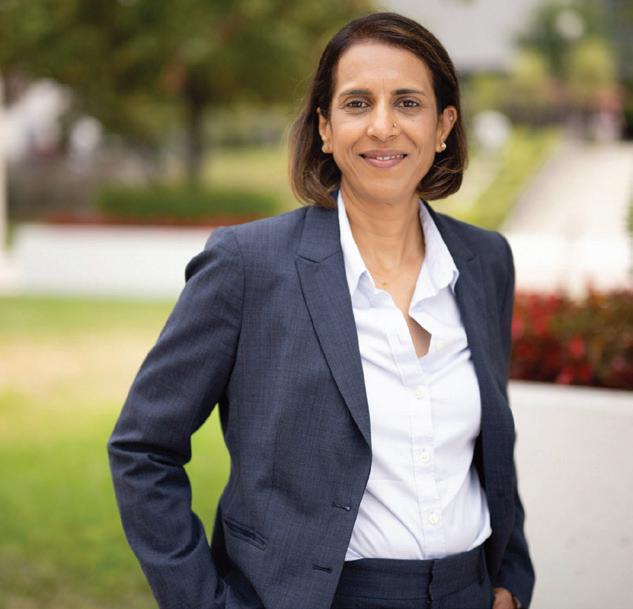
Optimizing Treatments
As a postdoc at Buffalo, Rao became interested in researching the impact of treatment on interactions between the host and the infecting pathogen, developing a strong focus in quantitative systems pharmacology. Her research also focuses on strategies to achieve adequate drug exposure within the lung. Rao has established a strong funding track record, with support from the National Institute of Allergy and Infectious Diseases— including two R-01 grants totaling more than $6 million—Department of Defense,
Cystic Fibrosis Foundation, and Food and Drug Administration.
“The knowledge Dr. Rao is building about complex host-pathogen interactions and disruptions is vital to addressing antimicrobial resistance,” says USC Mann Dean Vassilios Papadopoulos. “This is an urgent issue globally, as antibioticresistant ‘superbugs’ are making infections harder to treat. We are excited to have her join our faculty.”
At USC Mann, Rao will direct the Center for Quantitative Drug and Disease Modeling, an interdisciplinary research center and vital training ground for graduate students and postdoctoral fellows on model-informed drug discovery and development. At the center, she looks forward to creating interdisciplinary collaborations with researchers from across the university in medicine, public health, biostatistics and engineering— including David D’Argenio, Chonette Chair in Biomedical Technology and
professor of Biomedical Engineering at the USC Viterbi School of Engineering, another longtime mentor.
“Dr. Rao will lead advancement of the science of quantitative systems pharmacology, forging new collaborations and partnerships in academic and industry to expand the field’s therapeutic impact,” says Tien Ng, interim chair of the Titus Family Department of Clinical Pharmacy.
As a new member of the Trojan Family, Rao is excited about building her research program at USC and developing the next generation of pharmacometrics experts. She looks forward to helping students hone their abilities through supportive mentorship as she engages them as full research partners.
“The need for pharmacometrics is growing faster than we can train people,” she notes. “I want to develop a really strong training program that excites students to enter the field and prepares them for long-term success.”
8 USC MANN SCHOOL BROAD SPECTRUM
CAPPING INSULIN COSTS
Published in JAMA , the findings from USC and University of Wisconsin-Madison researchers suggest the Inflation Reduction Act’s policy reduced the number of Medicare enrollees who weren’t filling insulin prescriptions because of cost.
The Inflation Reduction Act’s (IRA) $35 price cap on insulin led to increases in the total number of insulin prescription fills for Medicare beneficiaries, according to a new study from the USC Schaeffer Center for Health Policy & Economics and University of Wisconsin-Madison.
Following the cap’s enactment in January 2023, the number of insulin fills among Medicare Part D enrollees increased from 519,588 to 523,564 per month. In contrast, the number of insulin fills decreased among older adults without Medicare during the same period. The study was published in the Journal of the American Medical Association in July.
The out-of-pocket cost of insulin has skyrocketed for Medicare enrollees, from $235 million in 2007 to more than $1 billion in 2020. As a result, many patients with diabetes ration the lifesaving drug, increasing the risk of poor health outcomes. In January, the IRA capped all Part D beneficiaries’ out-of-pocket costs for insulin at $35 for a month’s supply. The study’s findings suggest the cap is encouraging patients to fill their insulin prescriptions.
“Many Americans are concerned with the cost of insulin because people with diabetes are at great risk of serious health problems, including nerve damage, heart attack and stroke,” notes study co-author John A. Romley, associate professor at the USC Mann School and the USC Price School of Public Policy and a senior fellow at the Schaeffer Center. “This new policy has the potential to do two things: save money for people who are taking insulin, and help people afford insulin to begin with.”
To examine the cap’s effectiveness, researchers used data from IQVIA’s National Prescription Audit, which includes 92% of retail pharmacies and 70% of mail-order and long-term-carefacility pharmacies. The study sample included 14 million insulin fills. Researchers compared changes in insulin fills for Medicare Part D enrollees ages 65 to 74 with changes among 60- to 64-year-olds without Medicare insurance. The researchers compared outcomes before (September through December 2022) and after (January through April 2023) the IRA cap took effect. While insulin fills increased among Medicare Part D enrollees after the cap, the number of fills for those without Medicare dropped from 344,719 to 330,229 per month during the same period. Additionally, the average number of monthly fills with out-of-pocket expenses of $35 or less grew from 340,509 to 366,928 for Medicare enrollees. For those without Medicare, those less expensive fills fell from 242,733 to 220,867, the study found. After adjusting for differences in the study sample, the analysis suggests that Medicare beneficiaries filled about 50,000 more insulin prescriptions per month that were below $35, and about 20,000 of these fills would not have taken place if not for the policy.
Former Mann School faculty member Rebecca Myerson, now at the University of Wisconsin, served as lead author, while co-authors were Dima M. Qato, Hygeia Centennial Chair at USC Mann and a senior fellow at the Schaffer Center, and Dana Goldman, USC Price dean and Schaeffer Center co-director. The research was partially funded by a grant from the National Institute of Diabetes and Digestive and Kidney Diseases (R01DK107552).

9 RESULTS FALL 2023
Ensuring access to affordable insulin is critical for promoting health equity given that Black and Latinx individuals— including among Medicare populations—are more likely to suffer from diabetes and experience barriers in accessing diabetes medications, such as insulin.”
Dima M. Qato, Hygeia Centennial Chair at the Mann School and a senior fellow at the USC Schaeffer Center
New Beginning for Future PharmDs
A new class of students formally began their four-year journey to becoming Doctors of Pharmacy at the annual USC Mann White Coat Ceremony in August.

Dean Vassilios Papadopoulos welcomed the Class of 2027, noting its diversity— students hail from 19 countries—and
strong academic track record. He advised them to spend their time at USC Mann exploring the many opportunities and avenues available to them.
“Whatever path you choose, one thing is certain: You will not be walking it alone,” Papadopoulos said. “You will always be a
member of the Trojan Family—and more specifically, the Trojan Pharmacy Family.” Robert Popovian, PharmD ’93, MS Pharmaceutical Economics and Policy ’97, and member of the USC Mann Board of Councilors, served as keynote speaker. Read more at mann.usc.edu.
USC Schaeffer Center for Health Policy & Economics ranks among the top five in the world in the field of health economics, along with Harvard University, Massachusetts Institute of Technology, Stanford University and University of Chicago, according to IDEAS, the largest bibliographic database dedicated to economics.
10 USC MANN SCHOOL BROAD SPECTRUM
Students taking a selfie after receiving their new white coats
LIBERTI TO DIRECT D. K. KIM INTERNATIONAL CENTER
Richmond Awarded Emeritus Status
Longtime USC Mann School faculty member Frances Richmond has earned emeritus status from the university.
“This award recognizes faithful service worthy of high commendation and expresses an anticipation of continued membership in our academic community,” according to Andrew T. Guzman, provost and senior vice president for academic affairs.
Lawrence Liberti has joined the USC Mann School as director of the D. K. Kim International Center for Regulatory Science and associate professor in the Department of Regulatory and Quality Sciences.
Prior to his USC appointments, Liberti was head of regulatory collaborations and executive director at the Centre for Innovation in Regulatory Science in London and an adjunct research professor at Temple University School of Pharmacy in Philadelphia. Previous roles include executive director of the nonprofit Erudee Foundation, which provides educational opportunities in healthcare in low-income countries. He is a board member of the Regulatory Affairs Professionals Society and past board member of the American Medical Writers Association (AMWA).
Liberti has been working in the international pharmaceutical industry for almost four decades. He founded Pharmaceutical Information Associates, a regulatory consulting firm that he served as president from 1990 to 2005. He has also worked as a pharmacist at community and academic hospital pharmacies.

As director of the D. K. Kim International Center, Liberti succeeds the retiring Frances Richmond, founding chair of the Mann School’s Department of Regulatory and Quality Sciences, whose leadership established the center in 2012.
“Dr. Liberti was the ideal candidate to build on Dr. Richmond’s extraordinary legacy,” notes Vassilios Papadopoulos, dean of the USC Mann School. “Her vision and drive propelled the D. K. Kim International Center as the preeminent resource for training, research and analysis that fosters regulatory harmonization. Dr. Liberti combines the expertise and passion necessary to take the center’s mission to new levels in helping improve health worldwide.”
That expertise was honored when Liberti was named global fellow in medicines development by the International Federation of Associations of Pharmaceutical Physicians and Pharmaceutical Medicine Academy. His other plaudits include the AMWA Golden Apple Award for Excellence in Teaching.
“Through his expertise, Dr. Liberti will enhance our curriculum, contribute to expanding our research and foster growth within the international regulatory science field,” says Eunjoo Pacifici, chair of the Department of Regulatory and Quality Sciences.
Liberti earned his PhD in international regulatory policy from Utrecht University in the Netherlands and his MSc in pharmacognosy from the University of the Sciences in Philadelphia (now Saint Joseph’s University).
Richmond launched the International Center for Regulatory Science at USC in 2012 after establishing the school’s regulatory science program in 1999. She created the first professional doctorate in regulatory science in 2008. In 2017, she became the inaugural chair of the USC Mann School’s new Department of Regulatory and Quality Sciences. Most recently, she served as director of the D. K. Kim International Center for Regulatory Science.
She earned a PhD in neurophysiology from Queen’s University in Ontario, where she later served as associate dean of life sciences. She was the first woman appointed a director of a research consortium funded by Canada’s Medical Research Council.

11 RESULTS FALL 2023
POSSIBILITIES INFINITE

A LOOK AT THE WIDE AND VARIED ROLES OF USC MANN ALUMNI
By Susan L. Wampler
The vast field of pharmacy and pharmaceutical sciences touches all aspects of the human condition. Its impact is broad and deep—from direct patient care and the discovery of groundbreaking treatments to the creation of policies and regulations that affect how we access and value healthcare.
With the school’s mission of advancing health through innovation—and the importance of pharmacy and pharmaceutical sciences to humankind—USC Mann has long focused on training new generations of professionals for the full spectrum of relevant career opportunities, including those not yet imagined.
With more than 20 degree programs—from undergraduate to master’s and doctoral offerings as well as residency, fellowship, certificate and international-pharmacist programs—Mann students typically gain expertise in multiple areas and often pursue dual degrees. Interest in the school’s programs continues to flourish. A positive outcome from the pandemic was the dramatic increase in undergraduates drawn to the Mann School’s bachelor’s programs in biopharmaceutical
continued on page 15
12 USC MANN SCHOOL

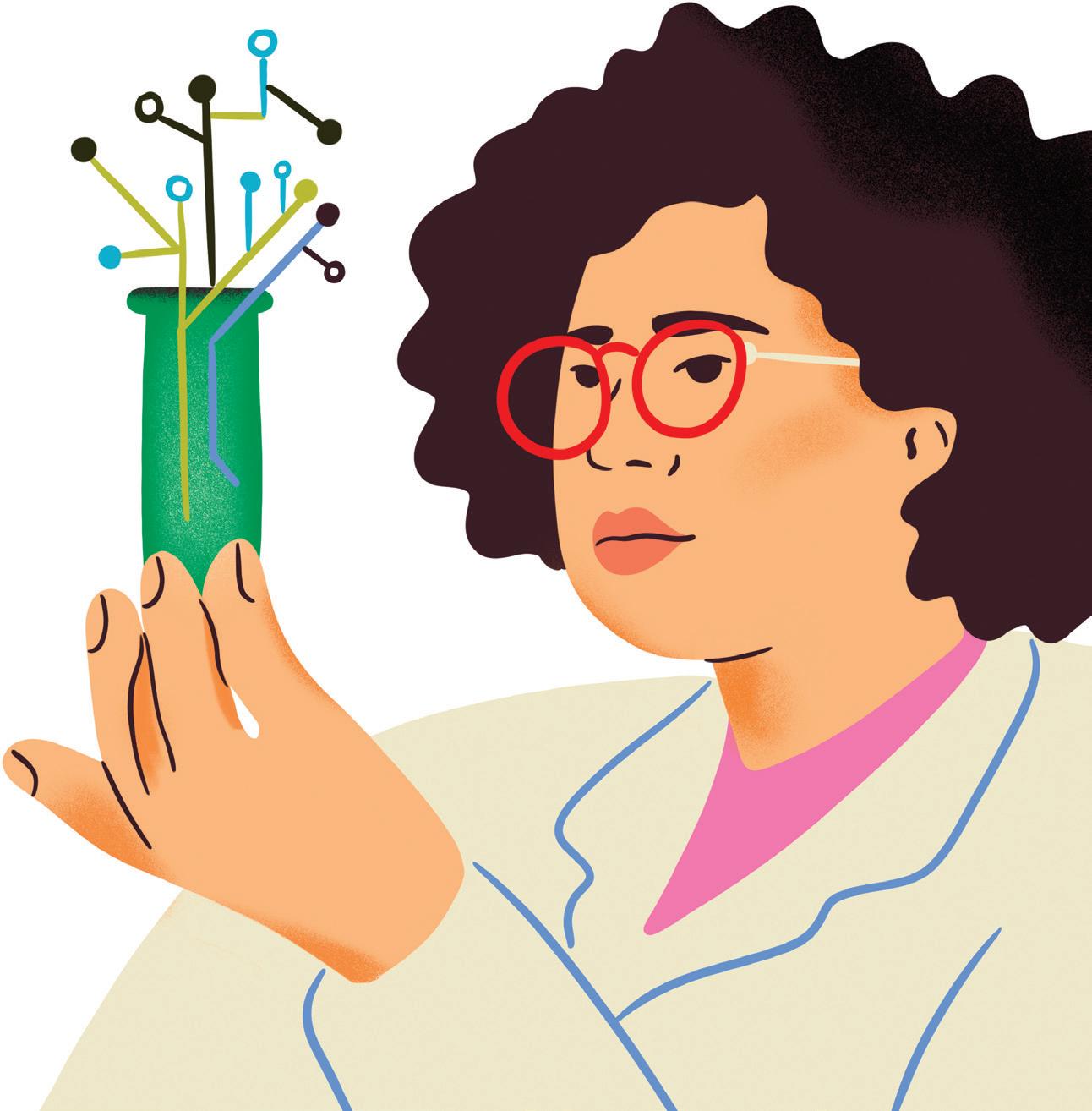
13 RESULTS FALL 2023
SELECT EMPLOYERS OF USC MANN ALUMNI
AbbVie
Albertsons Companies
Allergan
AltaMed Health Services
Amgen
Arcutis Biotherapeutics Inc.
AstraZeneca
Blue Shield of California
Boston Scientific
Bristol Myers Squibb
Cedars-Sinai Medical Center
City of Hope
The Compounding Pharmacy of Beverly Hills
CVS Health/CVS Caremark Corporation
Dana-Farber Cancer Institute
Edwards Lifesciences
Genentech
Gilead Sciences
GlaxoSmithKline
Johnson & Johnson
Kaiser Permanente
Keck Medicine of USC
Kite Pharma
L.A. County Department of Health Services
L.A. General Hospital (formerly LAC+USC Medical Center)
Long Beach Medical Center
Medtronic Merck Group
Novartis
Optum Rx
Pfizer Inc.
Quest Diagnostics
Ralphs Grocery Company
Ronald Reagan UCLA Medical Center
Riverside County Regional Medical Center
Sharp HealthCare


Stanford Health Care/Stanford
University Medical Center
UC Davis Medical Center
UC San Diego Health
Vir Biotechnology
Walgreens
14 USC MANN SCHOOL
sciences, pharmacology and drug development, regulatory science and biopharmaceutical business. In addition, the number of participants in the school’s pharmaceutical industry fellowships has doubled in the past couple of years.
Even within individual degree programs, students are exposed to and prepared for a wide variety of career opportunities. Students in the PharmD degree, for instance, may choose from a range of concentrations and specializations: comprehensive medication management and high-risk populations, education, health systems and care management, pharmaceutical industry, pharmacy entrepreneurship and research.
The need for new professionals continues to rise. According to Becker’s Hospital Review, more than 20,000 job openings for pharmacists are projected for this year, while the number of Doctors of Pharmacy entering the work force is only 17,000. A significant shortfall would occur even if all PharmD grads nationwide became practicing pharmacists.
“In the early days of the school, the majority of students trained to be community pharmacists and, at many pharmacy schools, that is still the case,” Dean Vassilios Papadopoulos says. “But today—and for many years now—our school has trained pharmacists and pharmaceutical scientists for all potential jobs, not just for a specific position.”
Approximately a quarter of the school’s new PharmD graduates now go on to roles in community pharmacies, he adds. Half work in hospital pharmacies and a quarter in industry, including as entrepreneurs.
Meanwhile, Papadopoulos notes, “the vast majority of our master’s and doctoral alumni work in industry—not only in drug discovery, regulatory science and healthcare economics, but also at venture capital firms working in biotech and pharmaceutical sciences. This reflects the incredible breadth of programs we offer.”

“We instill a big-picture vision, bolstered by support from alumni and faculty who serve as mentors to students and graduates throughout their careers,” adds Kari Franson, senior associate dean for academic and student affairs.
Mann alumni can be found all over the world, providing leadership and expertise in all aspects of this vast field:
›› They are in biotech startups, academic medical centers and major pharmaceutical companies, conducting basic and translational science, managing clinical trials and creating new knowledge that will fuel further advances and cures.
›› As entrepreneurs and drivers of innovation, they are reinventing traditional methods of drug delivery and pursuing disruptive technologies that can improve patient outcomes and access to care.
›› They are providing policymakers and government agencies with evidence-based solutions to pressing healthcare challenges as they develop new models for increasing access and value while reducing costs to protect the health of patients and the overall health system.
›› In hospitals, health systems and clinics, they are developing new approaches to comprehensive medication management and addressing chronic disease while demonstrating the importance of having a pharmacist as a key member of the healthcare team.
›› They are training new generations of leaders as they teach and provide mentoring as academic faculty members, preceptors, and executives and board members of professional associations.
›› In corporate boardrooms and government regulatory agencies, they are shaping company and country-wide strategies that commercialize regulated products and bring them safely and more quickly to consumers.
›› They are combining their knowledge of pharmaceutical science with other fields—from informing the practice of law to even writing and publishing works of fiction.
USC Mann’s more than 11,000 living alumni continue shaping the future of the field while improving lives throughout their careers. The following pages spotlight just a few examples of USC Mann alumni who are transforming the future of pharmacy and pharmaceutical sciences. Read more stories online at mann.usc.edu.
15 RESULTS FALL 2023
MELEENEH DERHARTUNIAN

PhD Genetic, Molecular and Cellular Biology ’10, Certificate in Clinical Trial Design and Management, Regulatory Science

Regulatory Documentation Team Leader, Product Development Genentech
MANN IMPACT
“Since graduating from USC, I have worked in two prominent data-driven and patient-centric companies. My work has directly contributed to patient access to innovative, safe and effective medical devices, as well as pharmaceutical and combination products in different therapeutic areas. My USC experiences and mentors enhanced both my technical and soft skills, priming me for my professional career. Their impact on me, professionally and personally, is priceless.”
ADVICE FOR STUDENTS
“My USC coaches and mentors challenged me by asking difficult questions and providing me with direct and constructive feedback, all with the aim of helping me grow as a scientist and strategist. Seek and take advantage of this purpose-built network—and feed forward their learnings through mentorship opportunities.”

JULIANNA MONTANO
BS Pharmacology and Drug Development ’23 (dual degree with BA in Philosophy, Politics and Law)
Technical Product Manager, Endocanna Health Student, Southwestern Law School
MANN IMPACT
“I did not think I could reconcile two disparate disciplines—philosophy and pharmacy—until I was at USC. Though the intersection is niche, law and science have immense impacts on society. USC was an easy choice because it gave me the freedom to try new things and learn from other majors. Now in law school, I am focusing on intellectual property and patents, which will have huge implications in healthcare and biotech. Another point of interest is malpractice law and patient advocacy.”
ENO INYANG
PharmD ’16
Clinical Pharmacy Manager and PGY-2 Oncology Residency Program Director
Dana-Farber Cancer Institute
MANN IMPACT
CHUN-JUN
(CJ) GUO


PhD Pharmaceutical Sciences ’14
Assistant Professor
Weill Cornell Graduate School of Medical Sciences
MANN IMPACT
“The rigorous training I received through the USC Pharmaceutical Sciences PhD program equipped me with a strong foundation in natural product chemistry, microbial genetics and analytical chemistry. This comprehensive background has proven invaluable in my research on unraveling the molecular mechanisms underlying microbe-host interactions.”
ADVICE FOR STUDENTS
“Pursue your passions. When you are driven by passion, your dedication and enthusiasm for your chosen field become boundless.”
“It wasn’t until starting pharmacy school that I learned oncology was a specific career path. A local comprehensive cancer center took three USC pharmacy students from each class for a three-year training program, and I was selected. This incredible opportunity allowed me to learn about cancer medications and work under pharmacists and technicians in several units of the hospital. My experiences at USC equipped me with the leadership and clinical skills to propel my career. The lifelong friends and colleagues I made continue to show up in my personal and professional life.”
ADVICE
FOR STUDENTS
“Push yourself to explore. I experienced the most growth when I opened myself up to new professional and cultural experiences. That’s the best thing about USC: There’s so much diversity and opportunity within and right outside its four walls. The best career advice I received was to be open to any opportunity that comes your way. You never know where it could lead.”
• • • • • • • • • • • • • • • • • • • • • • • • • • • • • • • • • • • • • • • • • • • • • • • • • • • • • • •
• • • • • • • • • • • • • • • • • • • • • • • • • • • • • • • • • • • • • • • • • • • • • • • • • • • • • • •
• • • • • • • • • • • • • • • • • • • • • • • • • • • • • • • • • • • • • • • • • • • • • • • • • • • • • • •
• • • • • • • • • • • • • • • • • • • • • • • • • • • • • • • • • • • • • • • • • • • • • • • • • • • • • • •
• • • • • • • • • • • • • • • • • • • • • • • • • • • • • • • • • • • • • • • • • • • • • • • • • • • • • • •
• • • • • • • • • • • • • • • • • • • • • • • • • • • • • • • • • • • • • • • • • • • • • • • • • • • • • • •
• • • • • • • • • • • • • • • • • • • • • • • • • • • • • • • • • • • • • • • • • • • • • • • • • • • • • • •
16 USC MANN SCHOOL
PETER LASSOFF
PharmD ’86
Senior Vice President Head of Regulatory, Medical Writing and Regulatory Intelligence
Syneos Health, United Kingdom

MANN IMPACT
“The scholastic discipline instilled at USC was instrumental in forging my career. [It taught me to] always think of patients first—but with a commercial hat on as well. [The Trojan Family] is a connection that’s always there, which comes into light in the strangest of places and most fanciful of situations.”
ADVICE FOR STUDENTS
“Look beyond traditional roles. Why not have a job where you see the world? Don’t listen to those who advise you to do what everyone else does. Take some chances.”

SOHAIL MASOOD

PharmD ’08
President, Chair and CEO, KabaFusion
MANN IMPACT
“The training and education I received from USC Mann helped prepare me for multiple roles throughout my career— from a pharmacist caring for HIV/AIDS patients to an entrepreneur creating new businesses, including the nation’s largest independently owned, privately held home-infusion company.”
JORGE FARIAS


PharmD ’13, MS Healthcare Decision Analysis ’16
Director, Field Medical Outcomes & Analytics
Pfizer
MANN IMPACT
JESSICA ABRAHAM
PharmD ’11
Director of Population Health

USC Mann School of Pharmacy and Pharmaceutical Sciences
MANN IMPACT
“After completing an ambulatory care residency at USC Mann, I was a lead pharmacist in the school’s $12 million Center for Medicare & Medicaid Innovation grant promoting pharmacists collaboratively working with physicians to improve health outcomes while reducing costs. This led to a managed care opportunity with what is now Optum Health, where I spearheaded multiple medication management programs. I returned to USC Mann to cultivate partnerships that develop value-based pharmacy strategies aligned with population health priorities. Working for a national leader known for its progressive curriculum and clinical excellence allows me to truly make a difference.”
ADVICE FOR STUDENTS
“Never limit your potential. Think big and wide and be open to exciting new opportunities because you never know where they may lead.”
“Obtaining my PharmD and MS in Healthcare Decision Analysis from USC has given me the opportunity to have an exciting career in the pharmaceutical industry over the last 10 years. I have been involved in several health outcomes projects and worked on systemwide initiatives, including in the areas of chronic care, smoking cessation anticoagulation, rheumatoid arthritis, breast cancer and prostate cancer. Recently as therapeutic-area lead for hematology, I created the strategy for our team in preparation for the launch of a new multiple myeloma product.”
ADVICE FOR STUDENTS
“Get involved outside of the classroom in activities or projects that excite you. Stay involved with USC after you graduate. Students just like you will want to discuss career paths or work on projects that you might be able to help them get involved in. These could be life-changing experiences for them.”
• • • • • • • • • • • • • • • • • • • • • • • • • • • • • • • • • • • • • • • • • • • • • • • • • • • • • • •
• • • • • • • • • • • • • • • • • • • • • • • • • • • • • • • • • • • • • • • • • • • • • • • • • • • • • • •
• • • • • • • • • • • • • • • • • • • • • • • • • • • • • • • • • • • • • • • • • • • • • • • • • • • • • • •
• • • • • • • • • • • • • • • • • • • • • • • • • • • • • • • • • • • • • • • • • • • • • • • • • • • • • • •
• • • • • • • • • • • • • • • • • • • • • • • • • • • • • • • • • • • • • • • • • • • • • • • • • • • • • • •
• • • • • • • • • • • • • • • • • • • • • • • • • • • • • • • • • • • • • • • • • • • • • • • • • • • • • • •
• • • • • • • • • • • • • • • • • • • • • • • • • • • • • • • • • • • • • • • • • • • • • • • • • • • • • • •
17 RESULTS FALL 2023
DAVID E. MARTIN

PharmD ’91
President and CEO, TrippBio
MANN IMPACT
“I was given a great amount of flexibility to explore my interests in research. This work became the focus of my postgraduate residency research project and helped me gain entry into my research fellowship.”
ADVICE FOR STUDENTS
“Be open to new experiences. During my fourth year, I realized my interests were in asking questions that didn’t have easy answers. I would never have ended up in research if I had not been open to those new experiences.”
ANNIE OGOSTALICK
PharmD ’00
Field Director, West Medical Outcomes
Science Liaisons
AbbVie
MANN IMPACT
“Doors were gladly opened wide for me because of the high-quality education, research experiences and worldrenowned faculty I experienced at USC Mann. I was also fortunate enough to be in the first cohort of students awarded the John and Margaret Biles Leadership Scholarship in 1994. Dr. Biles personally mentored each of us to become leaders. I use many of the lessons he taught me in my daily work as a people leader at AbbVie.”
ADVICE FOR STUDENTS
“Take the time to truly assess your strengths and allow them to guide you to thrive in your profession.”
ANNET ARAKELIAN
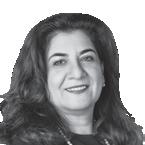
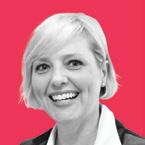
PharmD ’91

Vice President, Quality and Safety
Kaiser Permanente Washington Market
MANN IMPACT
“At USC Mann, I learned to be a systems thinker and to improve healthcare outcomes through reliable systems and processes. Part of the coursework [involved learning how] to understand and seek out where gaps and failures can occur and thereby build processes that create a reliable high-quality and safe system. It’s that foundational thinking coupled with a curiosity to seek and understand better ways of doing things that has stayed with me throughout my professional career.”
ADVICE FOR STUDENTS
“Always be curious and seek to understand how to get the best clinical outcome that modern medicine can provide. You are fortunate to be in a school that is at the heart of one of the largest and most diverse communities in the world. It’s a gift.”

• • • • • • • • • • • • • • • • • • • • • • • • • • • • • • • • • • • • • • • • • • • • • • • • • • • • • • •
• • • • • • • • • • • • • • • • • • • • • • • • • • • • • • • • • • • • • • • • • • • • • • • • • • • • • • •
• • • • • • • • • • • • • • • • • • • • • • • • • • • • • • • • • • • • • • • • • • • • • • • • • • • • • • •
• • • • • • • • • • • • • • • • • • • • • • • • • • • • • • • • • • • • • • • • • • • • • • • • • • • • • • •
• • • • • • • • • • • • • • • • • • • • • • • • • • • • • • • • • • • • • • • • • • • • • • • • • • • • • • •
• • • • • • • • • • • • • • • • • • • • • • • • • • • • • • • • • • • • • • • • • • • • • • • • • • • • • • •
18 USC MANN SCHOOL
DAVID MAKHANI

PharmD ’87
Co-owner, MDR Pharmacy

MANN IMPACT
“Pharmacy is a field that you can make whatever you want of.”
ADVICE FOR STUDENTS
“Explore as much as you can, because you are about to enter a field that is endless and you will always be able to grow.”
RAYMOND RISMAN
PharmD ’08, MS Regulatory Science ’07
Vice President, Trade Relations and Pharmaceutical Contracting Mark Cuban Cost Plus Drug Company
MANN IMPACT
“My broad experiences with the students and instructors throughout the dual-degree program at USC Mann prepared me well for leadership roles in the rapidly changing technologydriven healthcare industry.”

ADVICE FOR STUDENTS
“Try everything once! Having an idea of what you want to do is great and at times can be motivating. But excluding things without understanding them could eliminate potentially greater life opportunities.”
RUTH MADIEVSKY
PharmD ’08, MS Regulatory Science ’07
Clinical Pharmacist, UCLA Health
Editor and Novelist (All-Night Pharmacy)
MANN IMPACT
“I’m grateful every day that my USC education allowed me to study both pharmacy and creative writing/literature. Taking fiction and poetry workshops during my undergraduate education and attending as many literary events as I could while a pharmacy student helped me grow as a writer. My pharmacy school experiences also prepared me for my dream job specializing in HIV and primary care/ambulatory care! It’s a testament to the wonderful humanities and pharmacy education I received at USC that I was able to publish a novel while working full time as a pharmacist.”
ADVICE FOR STUDENTS
“Lean into your passions and double down on what sets you apart. Carve out time to commit to things that make you happy outside of your pharmacy work.”
DARSHAN MEHTA

PhD Health Economics ’18, MS Pharmaceutical Economics and Policy ’14
Director, Global Health Economics and Outcomes Research Moderna
MANN IMPACT
“My experience at USC has been instrumental in my current success. The health economics and outcomes research curriculum provided me with the relevant technical expertise to work in the field, and I was fortunate as a student to get two internships, at Amgen and AbbVie, in addition to working with my professors on industry projects.”
ADVICE FOR STUDENTS
“Network and build your connections. Gain real-time industry experience along with the graduate training.”
MEGAN ESTES
PhD Molecular Pharmacology and Toxicology ’14, MS Management of Drug Development ’14
Senior Clinical Strategy Manager Boston Scientific Corp.


MANN IMPACT
“As a student, I was given so many opportunities for development outside of the laboratory through attending conferences, presenting at local symposia, pursuing a regulatory science master’s degree, participating in predoctoral training programs, collaborating with multidisciplinary teams both within and outside of the university, and engaging in extracurricular activities, including the Pharmacy Graduate Alliance and Graduate Student Government, as well as serving on the board of directors for the school’s alumni association as a student representative. These experiences not only gave me exposure to possible career paths and areas of research outside of the narrow scope of my dissertation, but also provided me with an incredible network that has been critical in my career success.”
ADVICE FOR STUDENTS
“Take advantage of every opportunity presented to you at the Mann School. The experiences you have, the people you meet and the skills you develop may have a lifelong impact on your personal and professional life.”
• • • • • • • • • • • • • • • • • • • • • • • • • • • • • • • • • • • • • • • • • • • • • • • • • • • • • • •
• • • • • • • • • • • • • • • • • • • • • • • • • • • • • • • • • • • • • • • • • • • • • • • • • • • • • • •
• • • • • • • • • • • • • • • • • • • • • • • • • • • • • • • • • • • • • • • • • • • • • • • • • • • • • • •
• • • • • • • • • • • • • • • • • • • • • • • • • • • • • • • • • • • • • • • • • • • • • • • • • • • • • • •
• • • • • • • • • • • • • • • • • • • • • • • • • • • • • • • • • • • • • • • • • • • • • • • • • • • • • • •
• • • • • • • • • • • • • • • • • • • • • • • • • • • • • • • • • • • • • • • • • • • • • • • • • • • • • • •
• • • • • • • • • • • • • • • • • • • • • • • • • • • • • • • • • • • • • • • • • • • • • • • • • • • • • • •
• • • • • • • • • • • • • • • • • • • • • • • • • • • • • • • • • • • • • • • • • • • • • • • • • • • • • • •
• • • • • • • • • • • • • • • • • • • • • • • • • • • • • • • • • • • • • • • • • • • • • • • • • • • • • • •
• • • • • • • • • • • • • • • • • • • • • • • • • • • • • • • • • • • • • • • • • • • • • • • • • • • • • • •
19 RESULTS FALL 2023
A Life Without Limits
Emeritus Professor, donor and alumnus Mel Baron recently published a memoir, Beyond the Dream. Written as a love letter to his family across generations, it also recounts Baron’s colorful, purpose-filled life.

The autobiography tracks his early years of watching his father provide for the family during the Great Depression and World War II. The elder Baron succeeded in businesses for which he had no training or experience— from operating a hotdog stand (assisted by 10-year-old Mel) to owning racehorses and even running an illegal bookie operation.
The book then follows Mel Baron as he pursues a degree in the “sedate” field of pharmacy before going on to develop groundbreaking services such as home IV infusions and expanding his business until its purchase by a Fortune 500 company. It also explores his involvement in the civil rights movement in the late 1960s.
In 1981, Baron embarked on a new adventure as a part-time faculty member at the USC Mann School, joining full time as professor of clinical pharmacy in 1990. In all, he devoted more than four decades to the school. His achievements included helping create and serving as director of the firstlevel externship program. Leveraging his entrepreneurial and leadership skills, Baron also co-directed the PharmD/MBA program,
as well as teaching clerkships in pharmacy administration and on the healthcare needs of special populations.
The latter became a special passion, and he became renowned for championing efforts to improve the health of underserved populations—including as a consulting pharmacist for several community clinics that serve indigent patients in Los Angeles County. His scholarly focus was on the health literacy program he created to provide accessible health-related media for underserved and at-risk Latino populations.
Baron hopes his memoir will inspire future generations to reach beyond their perceived limits and embrace their dreams.
Beyond the Dream is available at BoyleHeightsPublishing.com. Anyone who makes a gift of $100 or more before December 31, 2023, to the Mel and Lorraine Baron Endowed Scholarship Fund at the USC Mann School will receive a copy. For more information, contact Cheryl Stanovich, chief development officer, at stanovic@usc.edu or 323-442-1738.
A HAVEN FOR STUDENTS

USC

20 USC MANN SCHOOL GIVING
Mann students enjoy relaxing, sharing research and congregating in the recently renovated Biles Leadership Center, made possible by donor support.
Right: Justin Prakaiphetkul, PharmD Class of 2026, and Olivia Ojeda, PharmD Class of 2025, connecting with peers in the Biles Leadership Center
Far right: John Kim, PharmD Class of 2025, enjoying the George T. Hori Student Lounge for a break between classes
Mel Baron signing copies of his book at a reception at the home of Maria Kootsikas, PharmD ’80
USC MANN WELCOMES NEW BOARD MEMBERS

Four experts in their fields have joined the Mann School as members of its Board of Councilors:
Edward Abrahamian earned his bachelor’s degree in architecture from USC in 1963. His older brother, Frank, graduated with a doctorate from the Mann School in 1959. After training as an architect at USC, Abrahamian worked for several Los Angeles-area firms before launching his own architecture and interior design company in Pasadena, Calif. The company quickly grew into a 40-person operation known as AP&T, for Abrahamian, Pagliasotti & Tanaka. He oversaw projects throughout Southern California and the western U.S., from department stores to celebrity estates.
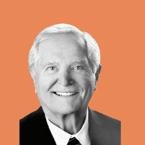
Debrina Johnson, PharmD ’13, is board-certified in both geriatric and ambulatory care and currently serves as a contract clinical pharmacist for health technology startup Arine, where she streamlines complex medication regimens for clients. Following graduation from USC, she served as a community pharmacist and pharmacy manager at Albertsons and was a preceptor for pharmacy students from Western University of Health Sciences and Loma Linda University. She has also served as an adjunct professor at the University of La Verne and Keck Graduate Institute. A past president of the Inland Empire Pharmacists Association, she is active in local, state and national pharmacy associations. Her research interests include underserved patient populations, substance use disorders, and longitudinal management of mental and behavioral health.

Kimberly Moore, PharmD ’16, MS Healthcare Decision Analysis ’16, is a medical outcomes science liaison at AbbVie, working as the scientific expert for regional decisionmakers in California, Hawaii and Nevada. She covers the entire AbbVie portfolio with expertise in immunology, oncology, virology, neurology, psychiatry, dermatology, rheumatology, gastroenterology, ophthalmology and an extensive pipeline. She also practices as a per-diem community pharmacist, providing vaccine, travel and contraceptive services, and is frequently tapped as an expert witness for community pharmacy litigation. Previously she was a member of the global health economics and reimbursement (market access) team at Edwards Lifesciences. She serves on the USC Alumni Association Board of Governors representing USC Mann.

Raymond Risman, PharmD ’07, MS Regulatory Science ’07, is vice president of trade relations and pharmaceutical contracting at Mark Cuban Cost Plus Drug Company, where he focuses on lowering the cost of branded prescription medications for broader access, flexibility and affordability. In prior roles, he negotiated and contracted Medicare, managed-Medicaid and commercial rebates with pharmaceutical manufacturers as part of the industry relations group at OptumRx. He transitioned to Optum Life Sciences, where he focused on utilizing broad data assets in combination with clinical, actuary, and health economics and outcomes research capabilities to develop innovative contracting strategies, while improving overall healthcare delivery. Risman cofounded a market access strategy firm focused on the payer perspective that has helped launch life science products across the biologic, small molecule and medical device therapeutic categories. In 2018, he joined a healthcare-technology startup focused on payer and pharmaceutical manufacturer contractual relationships. The company was acquired in 2020 by HealthVerity, where he remained before transitioning to Cost Plus Drug Company.
Donors of $500 or more by December 31, 2023, will receive a special commemorative gift celebrating the USC Mann naming. Contact Cheryl Stanovich, chief development officer, at stanovic@usc.edu or 323-442-1738.

21 RESULTS FALL 2023
By Lauren Amico
Prescription for Love
Brian Kim and Kathleen Donnelly Kim’s serendipitous connection defied parental pressures and societal norms, forging a love story that has spanned five decades, rooted in a shared passion for healthcare.

USC Mann alumni Brian Kim, PharmD ’72, and Kathleen Donnelly Kim, PharmD ’72, met in chemistry class as PharmD students.
In a room filled with new faces, Brian’s eyes scanned the crowd, hoping to find a friendly one, and there was Kathy, with a kind and radiant smile. He aspired to ask her out on a date. The perfect time came one afternoon when they were the last remaining in their chemistry lab. He mustered up the courage to ask her to a movie and, to his surprise, she said yes. Thus began a beautiful friendship.
As study buddies and confidants, they faced the challenges of pharmacy school together, providing unwavering support during trying times. As their second year drew to a close, Kathy prepared to head back east to marry someone else, leaving Brian devastated.

“Needless to say, it was the longest and saddest summer of my life,” Brian says. “I filled my time working two or three jobs just to pass the time and occupy my mind.”
As Brian was preparing to put his best foot forward for his third year at USC, he received a phone call from Kathy that left him shocked: The wedding had been called off. “I suddenly went from the lowest of lows to the highest of highs,” Brian recalls. Their friendship seamlessly evolved into love. They often studied and strolled by the ocean, an escape from the stress of school. During breaks from their studies, they volunteered at Los Angeles General Medical Center.
As their journey through pharmacy school neared completion, they pondered what the future held. Their relationship had weathered numerous storms, often due to their parents’ disapproval—Brian and Kathy’s relationship was crossing racial, cultural and religious boundaries.
They resolved to defy the negative voices and forge their own path. Saving diligently throughout the summer, they pooled their resources and embarked on a journey to Hawaii. They stayed until their money ran out, returning two-and-half months later with $100.07 left to their names. Undeterred, they decided to put on their own wedding—and never looked back.
On April 14, 2023, they celebrated their 50th wedding anniversary.

For their 50th anniversary meal, they enjoyed tacos from Jack in the Box, the same thing they used to eat when they were “as poor as church mice,” Brian says.
PharmDs in hand and side by side, Brian’s and Kathy’s careers flourished. They both were licensed in California, Nevada and Hawaii. Kathy took the hospital pharmacy route, working as a staff pharmacist at Valley Presbyterian Hospital in Van Nuys, Calif. There, she developed an IV additive program and retired as a pharmacy ward inspector. Brian managed medical building pharmacies all over Los Angeles and opened his own pharmacy in Tarzana, Calif. He retired as a staff pharmacist at Costco.
Now they reside in Encino, Calif., in the house they purchased in 1974 and where they raised their two children. They now also have two grandchildren.

“Pharmacy has provided us with a wonderful, satisfying life, fulfilling our need to be good community healthcare providers,” Brian says. “We would like to thank the USC Mann School for bringing us together and providing us with a wonderful, successful and happy life.”
Did you meet your significant other at USC Mann, too? Share your love story by emailing pharmcom@usc.edu.

22 USC MANN SCHOOL ALUMNI
RECOGNIZING EXCELLENCE: 2024 Alumni Awards


Eight outstanding leaders will be recognized at the 2024 USC Mann School’s Alumni Awards Gala on February 25:
Steven Dohi, PharmD ’84, will be presented with the Distinguished Alumni Award. He has been director of pharmacy services for L.A. General Medical Center since 2018. Prior to that, he held the same title at San Gabriel Valley Medical Center and has also served as pharmacy director for City of Hope.
Michael Pazirandeh, PharmD ’11, will receive the Young Alumni Award. He is principal medical scientist for managed care and government accounts at Gilead Sciences, where he conducts health economics and outcomes research. He has also held key roles in the field at Seagen, Bristol Myers Squibb and Blue Shield of California.
Raffi Svadjian, PharmD ’03, MBA, will be honored with the Community Service Award. As executive director of community pharmacies, he heads operations for USC Mann’s five pharmacies. He is also an assistant professor of clinical pharmacy at the school and previously served as senior director of the Keck Medicine of USC Specialty Pharmacy.


Ramesh Upadhyayula , PharmD, will receive the Honorary Alumni Award. He is the founder, CEO and director of pharmacy for Desert Hospital Outpatient Pharmacy Ambulatory Health, where he led development of its first accredited PGY1 ambulatory care residency program. He is also a pain management practitioner at the Comprehensive Cancer Center at Desert Regional Hospital in Palm Springs, Calif.

Robert Popovian, PharmD ’93, MS ’96, will be presented with the Dean’s Medallion Award. He founded the strategic consulting firm Conquest Advisors and serves as chief science policy officer for the Global Healthy Living Foundation. He is also senior health policy fellow at the Progressive Policy Institute and visiting health policy fellow at the Pioneer Institute. He previously served as vice president, U.S. government relations, at Pfizer.
Annie Ogostalick , PharmD ’00, MS ’00, will receive the Pharmaceutical Health Economics Award. She serves as field director of Medical Outcomes Science Liaisons at AbbVie. She is also a national clinical executive for Abbott Labs. Her previous experience included being team leader of outcomes liaisons at Eli Lilly.


Eric Forssen, PharmD ’77, PhD ’81, will receive the Research Achievement Award. His work has been vital to developing effective therapies and drug-delivery systems for conditions including cancer. He joined the startup that became NeXstar, which later merged with Gilead. He then worked in the drug-delivery group at Allergan. He has served as a voluntary faculty member at the Mann School for nearly 35 years.


Mary Ellen Cosenza , PhD, MS ’08, will receive the Regulatory Science Award. She is president of MEC Regulatory & Toxicology Consulting LLC. During a 20-year tenure at Amgen, she led its U.S. Regulatory Department and International Emerging Markets Regulatory Department and was an executive director of global regulatory affairs and safety. She also served as Amgen’s senior director of toxicology.
Dean Vassilios Papadopoulos at the 2023 Alumni Awards Gala. View more images and information at mann. usc.edu/gala.
23 RESULTS FALL 2023
class notes
We want to hear from you! Submit your updates and career news to mann.usc.edu/class-notes to be included in the next edition of Class Notes.
1980
s
Charles Stark , PharmD ’82 , is senior VP, clinical development and medical affairs at Emmaus Medical Inc.
James Patag, PharmD ’89 , is a pharmacy education manager at Novo Nordisk.
1990 s
Richard Ludwig Kleinberger, PharmD ’91 , is director of pharmacy and medical affairs at Script Care Ltd.
David E. Martin , PharmD ’91 , is president and CEO at TrippBio.
Amit Kakar, PharmD ’99 , is owner of Avalon Pharmacy in Yucca Valley, Calif. Avalon Pharmacy is one of three pharmacies named as finalists for 2023 Pharmacy of the Year by Good Neighbor Pharmacy out of more than 4,900 nominations.
2000

s
Juliana Setyawan , PharmD ’02 , MS Pharmaceutical Economics and Policy ’14 , is vice president and head of global health economics and outcomes research at Reata Pharmaceuticals.
Eric Wu , PhD ’02 , MS Regulatory Science ’02 , is managing principal at Analysis Group.
Gustavus Aranda Jr., PharmD ’04 , MS Pharmaceutical Economics and Policy ’06 , is field director, health economics and outcomes research at Bristol Myers Squibb.
Duc Bach , PharmD ’05 , was named 2022 San Gabriel Pharmacist of the Year by the San Gabriel Valley Society of Health-System Pharmacists. He is a clinical pharmacist at Whittier Hospital Medical Center.
Amanda Lamer-Rosen , PharmD ’06 , is an anti-infectives field medical director at Pfizer and an adjunct assistant professor at USC Mann.
Duane Mauzey, MS Regulatory Science ’06 , DRSc ’12 , is director of regulatory affairs for chemistry, manufacturing and controls (CMC) at Glaukos Corp.
Hari Prasad Narasimhan , MS Regulatory Science ’12 , is group lead, medical devices and combination products CMC, at Pfizer GRS India.
2010
Lilian (Chang) Lee , PhD Pharmaceutical Sciences ’10, is director of clinical science at Freenome.
Matthew Keushguerian , PharmD ’11, is director of business operations for ambulatory pharmacy at UCLA Health.
Michael Pazirandeh , PharmD ’11 , is principal medical scientist, managed care and government accounts, at Gilead Sciences.
Vincent Capati , PharmD ’14 , MS Regulatory Science ’14 , is an intellectual property attorney at Nixon Peabody LLP.
Sebastian Garcia , PharmD ’14 , is director of pharmacy operations, U.S. Navy Medicine Readiness and Training Command, in Sigonella, Italy.
Sean Feldman , PharmD ’17, MS Healthcare Decision Analysis ’16, is director of business strategy and operations, international, at Kite Pharma.
Jessica Chandler, PharmD ’18 , is a senior medical science liaison, hematology oncology, at the Janssen Pharmaceutical Companies of Johnson & Johnson.
Andrew Choi , PharmD ’18 , and Katie Choi , PharmD ’19 were expecting a baby in July 2023.
Christian Khoury, PharmD ’18 , is district leader, Rx, at CVS Health.
Andy Nguyen , PhD Health Economics and Policy ’18, is director of market access, rare disease, for Sumitomo Pharma America.
Stephanie Lim , PharmD ’19 , got married in June 2022.
Jeong Hee (Jennie) Lee , MS Healthcare Decision Analysis ’20, is representative, clinical records/ clinical affairs, at Edwards Lifesciences.
Nathan Nguyen , PharmD ’20, is ambulatory care oncology pharmacist at Kaiser Permanente.
s2020 s
ALUMNI
Ivy Bien , PharmD ’21, MS Healthcare Decision Analysis ’21 , is manager, medical information and content strategy, at Neurocrine Biosciences.
Jeremy Dow, PharmD ’21 , a clinical pharmacist at AltaMed Health Services, has joined USC Mann as a part-time special advisor for Diversity, Equity, Inclusion and Belonging Programs.
Nicole Fahmy, PharmD ’21 , is clinical pharmacist specialist at City of Hope.
Karolina Kapustova , PharmD ’21 , is an emergency medicine/intensive care clinical pharmacist at Riverside University Health System.
Trevor Lee , PharmD ’21 , is medical communications manager at Amgen.
Hugo Avila , PhD Pharmaceutical and Translational Sciences ’22 , is an advisor at Eli Lilly and Company.
Il Lee , PharmD ’22 , is a registered pharmacist at CVS Pharmacy.
Christian Rabot , PhD Pharmaceutical Sciences ’22 , is a scientist at Invizyne Technologies.

Neil Wang, MS Healthcare Decision Analysis ’22, is an investment banking senior associate at CITIC Securities.
Danijela Covo, BS Pharmacology and Drug Development ’23 , is a clinical research coordinator at Cedars-Sinai.
Anthony Manliguez , BS Biopharmaceutical Sciences ’23 , is a clinical research associate at Cedars-Sinai.
Shambhavi Nabar, MS Regulatory Science ’23 , is regulatory affairs specialist at Boston Scientific.
Trami Pham , PharmD ’23 , MS Regulatory Science ’23 , is clinical trials project manager at UCLA Health.
IN MEMORIAM
Charles Allen Hathcock Jr., PharmD ’56 , died in April 2023. He started his career filling prescriptions for Hollywood stars at the famous Schwab’s drugstores in Hollywood and Beverly Hills in 1956. He opened Allen Rexall Drugs in Huntington Beach, Calif., in 1962, and sold the business in 1984 to CVS, then continued to work for CVS for another two decades. After retirement, he volunteered as a pharmacist at Share Our Selves Community Health Clinic in Newport Beach, Calif. His family—Lindsey and Bob Miller, Greg and Moira Hathcock, and Amy and Brian Whitney—recently established the Charles Allen Hathcock Endowed Scholarship in his memory at the USC Mann School.
Jerome S. Schneider, PharmD ’56 , died in May 2023.
Glenn W. Eberhardt , PharmD ’62 , died in January 2023.
Lu Awarded $2.2M NIH Grant
Mangul Awarded $500K NSF Grant
Serghei Mangul, assistant professor of clinical pharmacy and quantitative and computational biology, has received a $500,000 grant from the National Science Foundation for a project to equip undergraduate students with essential skills in big data analytics. The effort aims to bridge an educational gap at community colleges and minority-serving institutions.

“Bioinformatics and data science are for all,” says Mangul, whose research focuses on improving the techniques of bioinformatics to better understand the mechanisms of disease.
He is collaborating with co-principal investigators at George Washington University, Georgia State University, Anoka-Ramsey Community College and Tuskegee University. In February, Mangul was awarded a five-year, $3.9 million National Institutes of Health grant to develop new software and databases to study diverse populations.

Zhipeng Lu, assistant professor of pharmacology and pharmaceutical sciences at USC Mann, was awarded a four-year, $2.2 million National Institutes of Health grant to develop and apply novel technologies to understand the structures and functions of RNA molecules in basic cellular processes, with the ultimate goal of treating neurological and other disorders.
“Despite extensive efforts in the past few decades, molecularly targeted therapies have not been possible for most human diseases,” Lu says. “While most previous studies narrowly focused on proteins, targeting RNA has emerged as an exciting new direction in drug development.”
He notes that a major challenge is lack of understanding of disease-related RNA structures in cells. For this project, his team will invent new chemical and computational methods to improve understanding of cells’ RNA structures and test the potential of targeting these structures to affect neurodevelopment and treat neurological diseases.
“Our new approach seeks to identify the Achilles’ heels of disease-related RNA molecules, opening up new opportunities in targeted therapeutics,” he says.


26 USC MANN SCHOOL FACULTY
New Faces
Dillon P. Cogan, PhD, has joined USC Mann as assistant professor of pharmacology and pharmaceutical sciences. His research explores how multienzyme complexes biosynthesize small molecules. He also examines the molecular mechanisms of bacterial signal transduction. As a National Institutes of Health (NIH) postdoctoral fellow at Stanford University, Cogan devised antibody-based imaging probes for cardiac surgeries. His awards include a nearly $1 million NIH grant for the study “Mechanism-Driven Engineering and Discovery of Bacterial Sensor Histidine Kinases.”
While earning his bachelor’s in chemistry at Michigan State University, Cogan developed proteasome inhibitors for treating multiple myeloma. He received his PhD in biochemistry from the University of Illinois.

CAMARERO RECEIVES MELANOMA RESEARCH GRANT
Julio A. Camarero, the John A. Biles Professor in Pharmaceutical Sciences at USC Mann, was recently awarded a threeyear, $375,000 grant from the Melanoma Research Alliance for a project that uses cyclotides—plant-derived, bioactive proteins—to target melanomas.

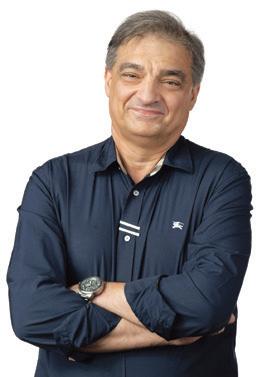
His lab previously discovered a novel cyclotide and has been working on strategies to improve its cellular uptake and pharmacokinetic profile with the hope that it will have therapeutic applications for several types of melanoma.
“We anticipate that this cyclotide-based inhibitor will have a broad spectrum of antitumor activities in human melanoma tumor cells,” Camarero says.
Radhika Venkatraman Kumar, BPharm, PhD, has been appointed assistant professor of pharmacology and pharmaceutical sciences. She has extensive teaching experience in life sciences, pre-pharmacy, pre-med, nursing and pharmacy programs, and her research interests include drug design and synthesis and biological evaluation of potential anti-cancer drug molecules. She also is interested in pharmacy education and in the science of teaching and learning and has presented and published in this area. As an assistant professor at American University of Health Sciences, she taught courses in pharmaceutics, biopharmaceutics, integrated pharmacotherapy, pharmaceutical calculations and introduction to medicinal chemistry. She received her MS and PhD in medicinal chemistry from the College of Pharmacy and Health Sciences at St. John’s University in New York, and a bachelor’s degree in pharmaceutical sciences from Mumbai University, India.

27 RESULTS FALL 2023
Darius Lakdawalla—the Quintiles Chair in Pharmaceutical Development and Regulatory Innovation and director of research at the USC Schaeffer Center—testified at a congressional hearing on biomedical innovation and patient access in May.
CLASS OF 2023: Encouraged to Trust Instincts, Take a Leap
Thousands gathered at the University Park Campus on May 13 as the USC Mann School of Pharmacy and Pharmaceutical Sciences marked its 116th Commencement—its first on the University Park Campus in decades.
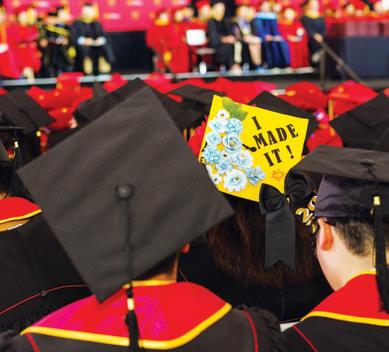


Janet S. Wright, MD, director of the Division for Heart Disease and Stroke Prevention at the U.S. Centers for Disease Control and Prevention (CDC), served as keynote speaker. In addition to her encouraging remarks, attendees heard inspiring words from Dean Vassilios Papadopoulos and three members of the Class of 2023.
Many of the graduates began their studies in fall 2019, just before COVID-19 spread around the world. They received their degrees only weeks after numerous international, national and local agencies officially declared the end of the pandemic as a health emergency.
“You will use the knowledge and skills you have gained to help others in future crises—whether global or individual, such as those who continue to face chronic disease,” said Papadopoulos, who presided over the event in McCarthy Quad.
Rising rates of chronic disease and opioid overdoses, and the need to improve health
equity and healthcare access, mean the skills instilled at the Mann School are needed now more than ever, Papadopoulos continued. “You have the expertise, the compassion, the courage and the dedication to step forward again,” he told the freshly minted alumni. “These diplomas bearing your names are a testament to the difference you have already made—and are destined to make in the future—in the lives of people everywhere.”
Define Your Purpose
Wright, a cardiologist who has overseen efforts such as Million Hearts, an initiative co-led by the CDC and the Centers for Medicare & Medicaid Services to prevent 1 million heart attacks and strokes in the United States, has dedicated her career to reducing the impacts of chronic disease.
She reflected on her upbringing as the child of a primary care doctor and nurse in a small Mississippi Delta community, where the town pharmacist was on call 24/7 and, along with her parents, would share medical advice as an “in-pew health expert” at the local church.
Originally aspiring to be a TV journalist, Wright described how she later turned her sights to cardiology, then association leadership, then federal service in public health.
Wright urged the graduates not to hesitate in questioning their professional priorities as well as personal goals. “Having endured a once-in-a-century pandemic, all of us have a new lens in defining our purpose on the planet,” Wright said. “You, too, will reinvent yourself. As you ricochet from the bumps and bruises of life, you, too, will redefine your purpose along the way. You’ll find your highest goal over and over. You, too, will leap perhaps several times in the decades ahead.”
She left the graduates with a lesson about decision-making she learned from her family’s beloved hunting dog, Polly, who
28 USC MANN SCHOOL STUDENTS
Dean Papadopoulos; celebrating a milestone
USC Mann student procession
would pause and quiver, head held high and nostrils flaring, when catching the scent of a nearby bird. “She completely trusted her senses,” Wright said, urging attendees to “pay attention when you catch a scent. Be still and listen to that. Is your heart pounding? Does that scent focus your mind and make your heart race? Track that path; follow that trail. Trust your instincts and take a leap.”
Stay Curious and Be Role Models
Samuel Garza, who earned a PhD in molecular pharmacology and toxicology, and a master’s degree in regulatory science, encouraged his fellow graduates to continue to ask themselves what they want to learn next. “As we gain knowledge, we realize the vastness of what we do not know,” said Garza, who served as 2022–23 president of USC Graduate Student Government. “Learning doesn’t end with a diploma, and it’s our responsibility to stay curious and take ownership of our education.”
Ryan Johnstonbaugh, president of the PharmD class, acknowledged the members of the Class of 2023 who volunteered to distribute vaccines in the community during the COVID-19 pandemic. Johnstonbaugh urged his peers not to forget that they will be role models for others. “Each of you has helped shape the environment,” he said. “We soon will be the goalposts that others try to achieve.”
Amen Obanor, who earned a bachelor of science in pharmacology and drug development, encouraged fellow graduates to reflect on the personal growth they have experienced in their journey toward a degree. “We are all here because we had a dream to reach a goal,” said Obanor, who served as 2022–23 president of the USC Pre-Pharmacy Society.

“2019 me would have been terrified to give this speech. 2023 me is still terrified, but I’m here. And that’s growth.”
Flag and banner bearers in the processional were Shambhavi Jayant Nabar, who earned a master’s degree in regulatory science, and Kerui Peng, who graduated with a PhD in clinical and experimental therapeutics and a master’s degree in regulatory management.

Top: Assistant Dean for Assessment Maryann Wu, Residency Program Director Richard Dang, and Regulatory and Quality Sciences Chair
Eunjoo Pacifici
Middle: Keynote speaker Janet Wright, Senior Associate Dean for Academic and Student Affairs Kari Franson, and Associate Dean for Graduate Education and Chief International Officer Terrence Graham
Above: Roshni Badlani, PharmD ’23, and her father, Anil “Neil” Badlani, a member of the school’s Board of Councilors
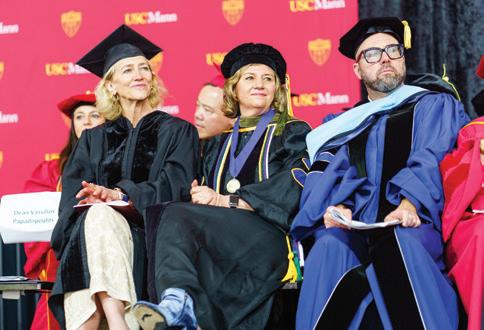
29 RESULTS FALL 2023 BY THE NUMBERS 191 Doctors of Pharmacy 5 Doctors of Philosophy (Clinical and Experimental Therapeutics) 2 Doctors of Philosophy (Molecular Pharmacology and Toxicology) 5 Doctors of Philosophy (Pharmaceutical Sciences) 4 Doctors of Regulatory Science 13 Masters of Science (Biopharmaceutical Marketing) 5 Masters of Science (Clinical and Experimental Therapeutics) 51 Masters of Science (Healthcare Decision Analysis) 10 Masters of Science (Management of Drug Development) 2 Masters of Science (Medical Product Quality) 12 Masters of Science (Molecular Pharmacology and Toxicology) 29 Masters of Science (Pharmaceutical Sciences) 3 Masters of Science (Regulatory Science) 19 Bachelors of Science (Pharmacology and Drug Development) 1 Bachelors of Science (Biopharmaceutical Sciences) 33 Residents 31 Fellows
DECODING DRUGS’ SOCIETAL IMPACTS
How is the human mind influenced by drugs? An innovative new multidisciplinary course from the USC Mann School will decode the effects of drugs—legal and illegal— on the human mind and society.

RXRS 202: Comparative Neuropharmacology—A Kaleidoscope of Experiences, offered starting fall 2023, is a four-unit elective open to all USC undergraduates. Taught by Michael Jakowec, associate professor of research neurology at Keck School of Medicine, the course explores the role of drugs by bridging two potentially underrepresented and underexposed novel perspectives: creativity and neuropharmacology. Also teaching a portion of the course will be Daryl Davies, associate dean for undergraduate education at the Mann School.
The course will:
• Investigate the historical and cultural significance of drugs by providing students with an in-depth understanding of how drugs have influenced diverse societies
• Bring a global perspective to natural and synthetic psychoactive compounds by exploring how these ancient substances were discovered and the initial implications for their hedonic or hallucinogenic properties
• Analyze how drugs have shaped and continue to influence creativity, art and literature
RXRS 202 joins a long line of class offerings at the Mann School that connect pharmacology and drugs’ societal impacts. These include Breaking Brains: Pharmacology of the Addicted Brain, Buzzed: Modern Substance of Abuse and Addiction, and Mysterious Deaths: From Poisons in Literature and History to Forensic Toxicology.
“I think this class is an excellent opportunity to bridge social science, pharmacology, neuroscience and the arts to come up with what may be a new way of thinking about humans and their brains and their chemical consequences,” Jakowec says.
More information about RXRS 202 can be found in the USC Schedule of Classes.
Understanding Mechanisms of Brain Inflammation in Alzheimer’s
Brandon Ebright, a PhD student at the USC Mann School, authored a new study on the mechanisms of brain inflammation in Alzheimer’s disease that was published in Alzheimer’s Research & Therapy. The research is the result of a collaboration between the laboratory of Stan Louie, director of the Mann School’s Clinical Experimental Therapeutics Program, Hussein Yassine at the Keck School of Medicine and scientists at Rush Medical Center in Chicago.
Using state-of-the art techniques to study brain lipids, the team identified greater lipid measures of chronic neuroinflammation in brain tissues of persons with APOE4 (the strongest risk-factor gene for Alzheimer’s disease) and dementia compared to APOE4 noncarriers. They then identified an enzyme, known as calcium dependent phospholipase A2 (cPLA2), that drives brain lipid changes. Drugs that can inhibit cPLA2 activity are potential targets to limit neuroinflammation for persons with APOE4 and dementia.

30 USC MANN SCHOOL STUDENTS
Lessons in Global Healthcare
USC Mann students traveled to Colombia, Bulgaria, Romania and Japan over the summer to explore and learn about issues in global healthcare. Meanwhile, a cohort of students from around the world visited USC for the annual International Summer Student Program (ISSP).

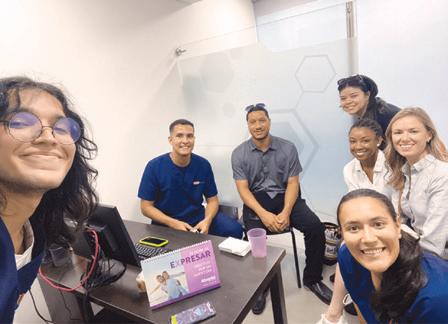
comprehensive risk management and the financial viability of the Colombia healthcare system



◄ International student cohort from 20 universities and 11 countries who joined this year’s ISSP at USC


31 RESULTS FALL 2023
▲ Terrence Graham—chief international officer and associate dean for Graduate Education and Postdoctoral Studies—with USC Mann students at the U.S. embassy in Bogotá, Colombia
▲ Mann students at Cartagena’s Castillo San Felipe de Barajas, a fortress built in 1536 and involved in several battles between the late 17th and early 19th centuries
▲ Mann students participating in a workshop at AmCare Pharmacy in Barranquilla to discuss

32 USC MANN SCHOOL
you recognize any of the students in this photo from the early 1970s? Send your comments to pharmcom@usc.edu.
PHOTO SHOP Do
LEAVING A LEGACY
The family of Charles Allen Hathcock Jr., PharmD ’56, established an endowed scholarship in his memory to continue his legacy while ensuring that new generations of students benefit from the stellar education offered at USC Mann.

We decided to endow a scholarship in memory of Dad because USC was such a big part of his life, and he loved being a pharmacist. His profession gave him purpose and a way to help people. We are thrilled he will have a legacy at USC.”
 Greg Hathcock
Greg Hathcock
Support USC Mann students and invest in their future. Make a gift online at mann.usc.edu/alumni-giving.
Right: Charles Allen Hathcock Jr., mid-1950s
Far right: Greg Hathcock with his father at the legendary 2005 USC–Notre Dame football game
Southern California

USC Mann School of Pharmacy and Pharmaceutical Sciences Health Sciences Campus
University of Southern California
1985 Zonal Avenue
Los Angeles, CA 90089-9121
mann.usc.edu
STAY IN TOUCH! Share news, update contact info and follow us on social media.
Nonprofit
US Postage Paid University
Organization
of
Owl in the family: The USC Mann community welcomed a family of great horned owls, who took up residence last spring on the fifth floor of the Pharmaceutical Sciences Center. A USC Mann Owl Cam shared their progress until the final owlet left the nest at the end of June.
 PUBLISHED BY THE USC MANN SCHOOL OF PHARMACY AND PHARMACEUTICAL SCIENCES
FALL 2023
PUBLISHED BY THE USC MANN SCHOOL OF PHARMACY AND PHARMACEUTICAL SCIENCES
FALL 2023


 John Stauffer Decanal Chair in Pharmaceutical Sciences
John Stauffer Decanal Chair in Pharmaceutical Sciences


























































































 Greg Hathcock
Greg Hathcock
